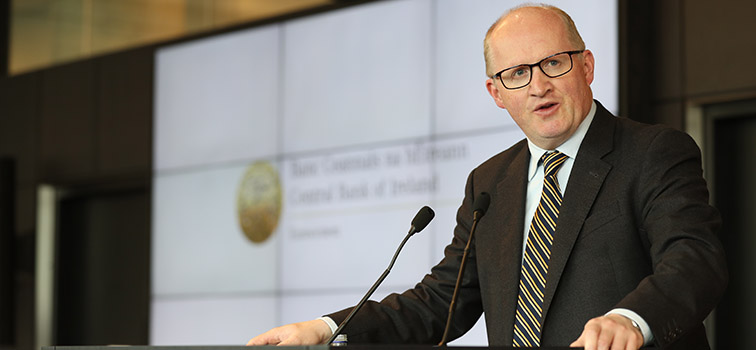This week the European Parliament will interview the only candidate for the position of chief economist of the European Central Bank. On what basis should Members of the EU Parliament ensure Mr Philip Lane is up to the job?
Edit: you can watch the video of the parliamentary hearing by clicking here.
In absence of any competitor, the appointment of Philip Lane as successor of Peter Praet as chief economist of the European Central Bank is considered by many to be a done deal. Still, Philip Lane will be quizzed tomorrow by the European Parliament, during a one hour public hearing (which will be livestreamed here), and his appointment will have to be voted upon by the complete chamber of European Parliament.
As we wrote few weeks ago, the process for appointing board member of the European Central Bank leaves much to be desired. The fact that only one candidate is being nominated by the Eurogroup (without even carrying a job interview) looks quite badly unprofessional. Besides, the European Parliament does not have a formal veto power in this process. Yet, the Parliament cannot credibly claim for more power in this exercise if it does not play its current role extremely seriously.
The European Parliament still has the power to influence, if not the selection of the candidate, the behaviour of the ECB board on certain matters. For example, the Parliament has successfully forced the ECB to take gender-balance seriously by rejecting the appointment of Yves Mersch in 2012.
In this article we have listed a number of critical principles and characteristics through which we will judge the performance of Mr Lane during the hearing tomorrow, and beyond.
1. Does Philipe Lane stand ready to review of the ECB’s monetary policy framework?
Despite 3 years of quantitative easing and a massively big balance sheet, the ECB has not succeeded in steering the Eurozone economy back to a sustainable path. Inflation has been too low for now more than 5 years in a row, and its repeated failures to provide accurate inflation forecasts are becoming noticeably embarrassing.
Put in a broader context, it appears that central banks have successfully managed to bring inflation under control over the past 30 years. In fact, they succeeded so well, that they are now having a hard time returning inflation “below but close” the 2% target. This new circumstance is unprecedented for central bank, and may require a more fundamental rethink than many central bankers currently dare to do.
In the face of this new uncertain world, Mr Lane will have a moral duty to take a sober look at both the new economic environment and at the ECB’s own failures in designing its monetary policy.
Mr Lane must depart from complacency. Instead of attributing failures to temporary phenomenons, Mr Lane should commit to take criticism onboard seriously. For example, this means getting rid of old-fashioned and flawed “loanable-fund” models, and ensuring that all ECB research encompasses the role of commercial banks as money-creating entities.
It is also time to acknowledge that the new economic environment and underlying dynamics have become very different from the ones central banks were used to. For example, the current low-inflation trend might have become underpinned by structural factors (eg. secular stagnation or technological deflation). The ECB should look at the implications of this possible scenario. There is also an intense debate on whether central banks should re-define price stability, a debate in which the ECB has been sadly missing out so far.
Such an approach would naturally lead Mr Lane, as ECB chief econmist, to engage in an in-depth review of the ECB’s monetary policy framework. Such review does not need to look at Treaty change: it could consist in looking at whether and how to define price stability, and reassess which instruments are better suited for that task.
The last time the ECB did review its framework was in 2003. Now that the US Federal Reserve and the Bank of Canada have both announced a review of their monetary policy framework this year, the ECB has no more excuse anymore. Mr Lane should embrace this task.
2. Will Philip Lane re-affirm the ECB’s commitment to do “whatever it takes”?
While enhancing a long-term rethinking of the ECB’s mandate, the European Central Bank’s chief economist should also ensure the ECB can react to short-term shocks.
This requires the ability to think outside of the box and stand firmly committed to using all the tools the ECB as at its disposal in order to carry out monetary policy. The ECB’s chief economist should signal an open-mind to using the ECB’s balance sheet in innovative ways such as through direct cash transfers to households (helicopter money). Although the ECB may not need to activate such instrument, the willingness to use helicopter money is paramount to signal the ECB’s commitment to do whatever it takes. A failure to do so could spur doubt of the ability of the ECB to enact radical monetary policy tools, should dire circumstances arise, and the perceived risk of such a failure would be detrimental to the ECB’s credibility.
Not only should Mr Lane should think outside the box, but he should also ensure the ECB has practical contingency plans ready in case the Eurozone economy were to deteriorate further and the ECB had to react quickly. This means carrying out all required feasibility studies to enact instruments such as helicopter money.
3. Will Philip Lane make the ECB a leading player in the fight against climate change?
Central banks are rightly focusing on long-term stability, and as such, they should be primarily concerned about the impact of climate change on the economy and society.
As recently acknowledged by Mario Draghi, the current European Parliament played a strong role in alerting the ECB to the risks related to climate change and the impact of the ECB’s own policies on the environment. In the same vein, ECB board member Benoit Coeuré also made an important speech in Berlin where he stressed the importance for the ECB to look at climate change.
It is extremely positive that Philip Lane has already expressed his conviction that “central banks have a leadership role in ensuring that climate change is a strategic priority for the financial system as a whole,” in a recent speech.
As both Draghi and Coeuré will be leaving the ECB later this year, it is key that their legacy on this front is being carried onwards. But Mr Lane’s efforts should go much further beyond the baby steps already taken by the ECB. Mr Lane should ensure sustainability and climate change risks are fully incorporated into the central bank’s DNA, from the risk assessment to the monetary policy formulation, and even by re-assessing the ECB’s market neutrality approach.
4. Will Philip Lane support a cultural shift inside the ECB?
Finally, a modern central bank like the ECB should make sure it is aligned with society’s needs, democratic values and face new challenges such as Euroscepticism and populism. For too long, central bankers have been presenting themselves as powerless bureaucrats which merely do what they are told to by their mandates. Such an attitude is no longer acceptable in the face of mounting evidence that central banks’ decisions have huge political implications, given the room for interpretation of their mandates, and finally given the groupthink and lack of diversity within central banks.

At Positive Money Europe, we are convinced that a cultural change is required within central banks in order to ensure they are aligned with society and deliver better policies for the economy. As with any other board member, we expect Mr Lane to contribute to changing the culture within the central banking community, starting from Frankfurt.
Obviously a good place to start would be to support long-standing demands for more transparency from the ECB and more parliamentary power in the accountability framework of the ECB. A strong signal in this direction would be for Mr Lane to commit to refuse his appointment in case the Parliament would not ratify it. Although mostly symbolic, such a declaration would set a strong precedent for giving more importance to the Parliament in this process.
As an Irishman, Mr Lane should know that the Eurozone crisis has left many scars within society, which in turn is fueling criticism of central banks and concerns about their independence. Instead of lecturing people about the benefits of central bank independence, Mr Lane should support initiatives aiming at creating new ways of engagement with the public, thus allowing frustrated citizens to have a two-way conversation directly with high-level policymakers.
Perhaps more importantly than the length of his CV and academic contributions, Mr Lane should stand for more diversity (of race and gender, but also of culture, education and social-political background) within the ECB. This would, in turn, encourage a diversity of thought and perspective, increasing the organization’s capacity for critical thinking, self-reflection and policy decisions that reflect the interests of society as a whole.
Admittedly, this is a lot to ask for a central banker, but nothing less than that justifies the level of power and remuneration that all six ECB board members enjoy. We will see at tomorrow’s hearing whether Mr. Lane fulfills those requirements.


A well written and an interesting article! One minor correction though: currently 2 women are sitting at the Governing Council: Sabine Lautenschläger (EB Member) and Chrystalla Georghadji, Governor of the central bank of Cyprus. Obviously still a very marginal number and hope to see it evened out in the future!
P.S. you can find the actual info on the GC here: https://www.ecb.europa.eu/ecb/orga/decisions/govc/html/index.en.html
Thank you Kar, we fixed this.
If we really want to change the culture , we need to change more then one of de BCE’s directors in order to create the necessary criticlal mass if people believing that the central banks are instrumental in solving the climate crisis.
One man alone will not be able to do that if he does not have the political backup of the crowds and if he has spend too much time in and with the banking sphere.
EU Banks should give a proper return to savers. They should not be allowed to discriminate in the sharing of profits. Also Irish banks should be stopped charging mortage holders almost double the interest rate of other banks.